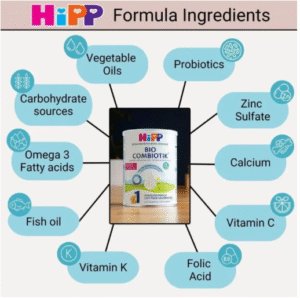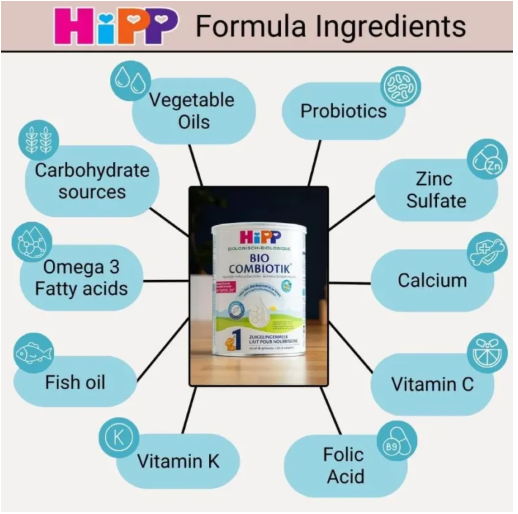Revealing the HiPP Organic Formula Secrets: What Set It Apart?
Revealing the HiPP Organic Formula Secrets What Set It Apart? From food to cosmetics to everyday objects, any luxury good starts with natural ingredients. Those are naturally occurring organic products free of genetically modified organisms (GMOs) cultivated without synthetic pesticides, herbicides, or fertilisers. This implies that the methods of producing the elements are better for the health of the surroundings and the customer. Moreover, organic farming techniques help to promote good soil and biodiversity—qualities needed for the long-term maintenance of our food chain.
Regarding food goods, organic components not only improve the surroundings but also offer several health advantages. For example, organic fruits and vegetables have showed greater antioxidants and other healthy components than items produced historically. Moreover high in other nutrients like omega-3 fatty acids are organic meat and dairy products. Natural products improve the surroundings apart from their advantages for health. Organic farming uses less energy; it also helps to slow down soil erosion, safeguard water, and lower water pollution. Selecting products with organic components—including the HiPP mix—allows consumers to support ecologically friendly farming methods so helping to preserve the earth for next generations.

Ecological Methodologies of Agricultural Development
Methods of sustainable farming define the long-term survival of our planet. Sustainable farming is applied ecologically friendly, economically sensible, and socially sensitive. This covers ideas in integrated pest management, cover cropping, and crop rotation. These methods assist to save water, slow down erosion, cut synthetic fertiliser and pesticide use, and preserve good soil. By allowing birds, good insects, and other animals find habitat, sustainable farming increases biodiversity.
Apart from the advantages for the surroundings, sustainable agricultural methods consist in social and financial ones. Farmers might cut their output costs and increase their profitability by using less synthetic inputs. Moreover, sustainable development is generating employment in rural areas and assisting their people. Using resources from these sources and supporting products made from sustainable farms helps consumers assist farmers seeking to preserve the environment and help to spread these vital practices.
Not created genetically altered organisms
Products labelled non-GMO are produced free of genetically modified organisms (GMOs). Originally developed in a lab to exhibit particular features, such herbicide or insect resistance, genetically modified organisms, or GMOs, they either Although conventional farming makes considerable use of genetically modified organisms, its probable effects on the environment and human health raise growing concern. Many consumers are opting to cut their prospective risk by avoiding genetically modified organisms in their food and other goods.
Not genetically altered, components utilised in non-GMO products have not changed. They thus help to prevent presumably negative consequences of genetically modified organisms, such as allergic reactions or antibiotic resistance. Non-GMO products can help sustainable farming methods since they inspire farmers to apply conventional breeding techniques and natural pest control procedures. Selecting non-GMO goods lets people support environmentally friendly farming and benefit their personal health as well as the preservation of the surroundings.
Not one artificial inclusion
Products free of synthetic components benefit the environment as well as the user. Processed foods and other products marketed to prolong shelf life, appearance, or taste abound in artificial additions like preservatives, colours, tastes, and sweeteners. Still, several of these drugs have been related to medical issues including cancer, allergies, asthma, and hyperactivity. Apart from basic health concerns, synthetic additions may endanger the surroundings. Say coal tar or petroleum for some synthetic colours and flavours; non-renewable resources are the source here.
Consumers who choose goods produced without artificial adds want to learn the HiPP formula and help more natural and sustainable production techniques by supporting products produced without artificial additions, so lowering their possible exposure to maybe dangerous chemicals. Simple, healthy ingredients fit the land and the body; many goods devoid of synthetic ingredients abound in this regard. Moreover less processed and more nutritious than those produced with synthetic additions are these items. Selecting goods free of synthetic chemicals helps customers not only with their own but also with the quality of the surroundings.
Exactly defined requirements
Products made under tight quality standards should be more safe, pure, and robust. These criteria guarantee that products devoid of toxins, adulterants, or pollutants could threaten the customer. Tight quality standards also guarantee that goods have constant degrees of active components and are manufactured in a way that maintains their potency and efficacy. Among the goods are vitamins, drugs, and personal hygiene products; most of them depend on this.
Selecting goods made under rigorous quality criteria helps customers to feel their safety and efficacy. Independent third-party labs frequently assess these items for potency and purity to either meet or surpass industry standards. Products developed under rigorous quality requirements also usually have premium components derived from reliable suppliers. Selecting goods produced under high quality standards enables consumers to assist their personal wellbeing and health.
Environmental awareness
Those who wish good decisions for the future give environmental stewardship first importance. From procurement of raw materials to manufacturing, packing, transportation, use, and disposal, goods created with environmental consciousness measure their worldwide influence all through their lifecycle. Everywhere reasonable, this means using renewable resources; it also helps to decrease waste and pollution; preserve energy and water; and lower greenhouse gas emissions.
Selecting products produced with environmental conscience enables consumers support businesses striving to reduce their influence on the surroundings. Along with certifications like USDA Organic or Fair Trade that show a dedication to sustainability, many of these goods include recyclable or biodegradable packaging. Products created with environmental consciousness sometimes also make advantage of better natural or organic resources available for the planet. Selecting products created with environmental awareness allows consumers to support businesses aiming at sustainable development.
Well defined labels
Those customers who wish to make wise choices on the products they buy depend on accurate labelling. The clear, correct information on the ingredients used in a product as well as the manufacturing site and procedure given by transparency labelling is precious. This covers certifications or claims—organic, non-GMO, fair trade, or otherwise as well as stating all ingredients in declining order of relevance. Clear labels can give specifics about presumably allergic reactions or other chemicals that might aggravate some persons.
Clear label products help consumers to believe the products they come across to be safe and of quality. Clear labels let people make logical decisions based on their own preferences and needs. Furthermore boosting customer and business confidence is giving correct, clear information on the goods or services under sale. Selecting well defined products helps customers support businesses engaged in moral activities.
Consumers should at last pick goods produced with organic components, sustainable agriculture practices, non-GMO materials, no artificial additions, stringent quality standards, environmental responsibility, and honest labelling for many different reasons. These goods provide the client different advantages as well as ones for the environment. Choosing these kinds of products helps people support sustainable agriculture, preserve their health, reduce their environmental impact, and make reasonable decisions on what they purchase. Eventually, by selecting goods made with these values in mind, consumers can help the surroundings to be improved.
